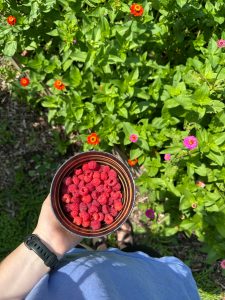 This summer, I am deeply grateful for all the growth and beauty I’ve been able to experience in the natural world. Cowles Bog, a trail in the Indiana Dunes National Park, was lovely the first time I hiked it in January, but now it gives a magical feeling filled in by green plants and dotted with yellow and purple flowers. I’m glad this summer that I am able to appreciate the beauty in moments of slowness. The garden I am helping with provides a different landscape of learning compared to hiking in the park with campers. But all of this growth, around me and in me, is a gift.
This summer, I am deeply grateful for all the growth and beauty I’ve been able to experience in the natural world. Cowles Bog, a trail in the Indiana Dunes National Park, was lovely the first time I hiked it in January, but now it gives a magical feeling filled in by green plants and dotted with yellow and purple flowers. I’m glad this summer that I am able to appreciate the beauty in moments of slowness. The garden I am helping with provides a different landscape of learning compared to hiking in the park with campers. But all of this growth, around me and in me, is a gift.My gratitude increases as I read Robin Wall Kimmerer’s book Braiding Sweetgrass because her thoughts lead me to find awe in the intricacies of the natural world. In this book, Kimmerer weaves Indigenous wisdom with scientific knowledge through her gift of storytelling, and proposes an alternate way to be in relationship with the earth. Her chapter “The Gift of Strawberries” has especially attuned me to notice the gifts and abundance around me. Through the poetic nature of her writing, Kimmerer draws on wild strawberries to describe the workings of a gift economy. She highlights how a gift creates an ongoing relationship between the giver and the receiver, and further, she articulates how the more something is shared, the greater its value becomes. In our economy of commodities, relationships are transactional, and positioned toward taking what one deserves. In a gift economy, action is based in the recognition of enoughness, and in abundance.
Looking at our world, I find it easy to see where economies of commodities rule relationships between people, objects, and our natural world. Instead of recognizing where there is abundance, I see systems of scarcity that grab hold of people and how they live. I see this economy of commodities run through what belongs to us, or what we think we deserve. I see it in the threats, cuts, and fears that tear apart relationships and build distrust. It is important to notice these spaces, to grieve where grief is necessary, to take action where action is needed. But also, I’m learning that recognizing the gifts and abundance is necessary to challenge this mindset of scarcity and fear. Kimmerer described a process of giving, receiving, reciprocating, that is essential to cultivating relationships and finding the enoughness through gifts.
This summer, I’m reminded of the gifts around me each and every day. These gifts are present in the striking color of wild flowers wading among the green lining a trail. The fragrance of flowers are a gift, along with the bee I hear buzz past me to continue pollinating. I hold the gifts in the abundance of harvest—zuchinni, cucumber, tomatoes, snap peas, green beans, and fresh raspberries—nestled in my arms and my hands. The gifts are also in environmental education, the teaching and practicing preservation. I hear these gifts in patient interactions with campers, where intentional affirmations build others up. I feel these gifts through the lovely people I am so grateful to know in the northwest corner of Indiana this summer.
As I think through calling and purpose, I have often circled back to themes of stewardship this summer. The more I notice the giving, receiving, and reciprocating in a gift economy, the more I see the call to steward these gifts. If gifts are a form of building relationships, there is a responsibility we are called to through stewardship. When stewardship is out of mind, gifts become fought for resources that promote mindsets of scarcity. But when we steward what we have been given, there is a deeper understanding of enoughness in the abundance for everyone to participate in the gift.
I’m grateful for my fellow staff members, housemates, friends, and this corner of Indiana as a whole for all the gifts that have been given so abundantly to me, and to each of us. May we be stewards of all this, the gifts we have been given.
Emma Johnson, Dunes Learning Cente